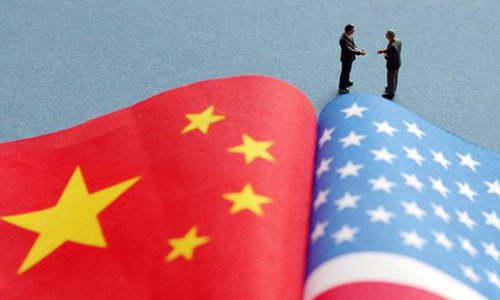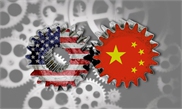
Chinese and US trade officials make attempt at striking a trade deal to defuse an increasingly bruising trade war. Photo: VCG
Recent engagement between China and the US on trade practices is creating favorable conditions to bring them back to the negotiating table, which also shows that they are trying to meet each other halfway and are making efforts to resolve issues of mutual concern, experts said on Friday.
The face-to-face talks between deputy trade negotiators in Washington, which resumed after nearly two months, have created a foundation for the next round of talks in October, they noted.
A delegation of Chinese officials, led by Vice Finance Minister Liao Min, met their counterparts at the US Trade Representative's office on Thursday and discussions between the two sides lasted until Friday, media reports said.
After trade talks with Chinese negotiators wrap up in Washington this week, a smaller group of those officials, led by Vice Minister for Agriculture and Rural Affairs Han Jun, are planning to visit US farming regions to meet with the producers, CNBC said.
The discussions between Chinese and US deputy trade negotiators are likely to show consensus in certain areas, such as China's purchase of US agricultural products, if members of the Chinese delegation will visit some farm regions in the US next week, said Gao Lingyun, an expert at the Chinese Academy of Social Sciences.
More details on the purchase of US farm products need to be tackled, such as pricing and insurance, Gao told the Global Times on Friday.
Other issues, such as technology transfers and intellectual property rights protection, were also possibly discussed, Gao said.
Right direction
The two sides are trying to build goodwill and make substantial progress for the next round of negotiations, experts said.
The US announced on Tuesday it would temporarily exempt 437 types of Chinese products from tariffs that the Trump administration imposed since last year. The exemptions were announced after firms and other entities in the US submitted more than 1,100 exclusion requests.
China's Ministry of Finance announced earlier this month it would remove 16 American product lines from tariffs. US President Donald Trump then said he would delay increasing tariffs on $250 billion in Chinese goods by two weeks to October 15.
Expectations have risen that the preparatory talks, which end this week, would lead to the right direction ahead of the 13th round of talks in October, Bai Ming, a research fellow at the Chinese Academy of International Trade and Economic Cooperation, told the Global Times on Friday.
"But [China] should not be caught off guard, given the US' back-and-forth in trade talks during the yearlong negotiations, and should be fully prepared," he said.
China is expected to make alternative plans. "We are open to talks, but we will not give in if the US escalates the trade war," Bai noted.
"A temporary bilateral agreement is possible at the annual summit of the Asia-Pacific Economic Cooperation Forum in November in Chile, as such a deal would be consistent with both countries' interests," said Wang Yiwei, director of China's Institute of International Affairs at Renmin University of China in Beijing.
Trump needs the agreement to "show off one of his achievements in office," since he hopes to be re-elected and tries to ease the pressure on the US economy caused by the trade war and a global economic slowdown, Wang told the Global Times on Friday.
China is expected to insist on its own development pace, like capitalizing on its industry advantage, Wang said.
US industrial and commercial circles have expressed concern over the trade conflicts between China and the US, and expect both sides to resolve the tensions through talks, Geng Shuang, spokesperson of China's Ministry of Foreign Affairs, said at a press conference in Beijing on Friday.
The comment came after the US-China Business Council released a report, which said trade tensions between China and the US have created a negative impact on American companies that have a large presence in the Chinese market.
"We hope the US could make efforts with China to reach an agreement on the basis of mutual respect and equality," Geng said.

